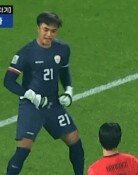Tension looms between rival parties over current issues
Tension looms between rival parties over current issues
Posted May. 16, 2013 02:50,
With the effective first floor leadership teams of the ruling and main opposition parties in the Park Geun-hye administration completely formed, attention is focusing on compatibility within the parliamentary floors of the rival parties over key pending political issues.
Choi Kyung-hwan, new floor leader of the ruling Saenuri Party, and Jun Byung-hun, his counterpart of the main opposition Democratic Party, made it clear that they would never lose leadership in addressing state affairs, vowing a strong ruling party, and an opposition party with clear mandate, respectively, soon after their election on Wednesday. Hence, watchers predict that the floor leaderships of the two parties will face conflict between hardliner and hardliner over key pending issues in the course of their race to push for their own orientations of political agendas.
The most pressing matter facing the new floor leaderships is the Yoon Chang-jung sex scandal. The Democratic Party already vowed to seek a parliamentary hearing on Yoon Chang-jungs sex assault case and deterioration of national dignity soon after the scandal broke, while Choi also has urged thorough probe into the case. As for whether the National Assembly will hold a parliamentary hearing, the two sides have displayed subtle differences in stance. Floor leader Jun said, (The Yoon Chang-jung fiasco) is directly linked to national dignity, and we have no intent to politically utilize it too excessively, adding however, If (the presidential office) seeks to downplay it and conceal the truth surrounding this matter, we have no choice but to demand more stern measures.
Jun means that though his party would not use a parliamentary hearing on the Yoon scandal as a tool of political offensive, but if proper corresponding measures are not taken at the government level, his party could demand a hearing anytime. Meanwhile, at a press meeting he offered after his election, Choi of the ruling party said, Since investigation is underway at this point, we have to wait and see, clarifying his opposition to the hearing. As a key figure in the pro-Park faction of his party, he means that a parliamentary hearing on the Yoon Chang-jung case that would burden President Parks administration of state affairs in this years second half is out of the question. Some figures in the ruling and opposition parties predict that the rival parties will engage in a tug of war over whether to hold a parliamentary hearing on Yoons case for the time being, in conjunction with the conditions for holding an extra parliamentary session in June, which will serve as the stage for the two floor leaders to debut.
The two sides have displayed slightly different views on the timeline and speed of legislation of various economic democratization acts as well. Floor leader Jun said just as former floor leaders of the ruling and opposition parties agreed upon, he would seek to have the anti-trust regulation act, and the franchise business act deliberated during the National Assembly session in June. He also said he would pursue a political party that consoles pain and disadvantages of the less privileged in business relations, which its chairman Kim Han-ghil is pushing for. This is interpreted as his commitment to strongly push for enactment of economic democratization acts that the rival parties are still debating, including a revision bill to the Fair Trade Act, which calls for expanding the scope of responsibility of conglomerates owners in the event of internal trading with affiliates.
In contrast, Choi, an economic bureaucrat-turned politician who is most vocal in the ruling camp in urging parliament to slow down the process to legislate economic democratization acts, believes that enactment of such acts should be implemented by taking into consideration economic situations, including the depreciation of the yen. He said again on Wednesday, As for the content and scope of economic democratization acts, the ruling and opposition parties could have differing views. An aide to Choi said, Economic democratization acts should be enacted as planned, but their priorities will vary. Notably, such measures should not send wrong signals to economic players.
Despite this situation, however, some watchers still have expectations that rare practice of politics between the ruling and opposition parties may revive this time around, given that politicians who are considered relatively reasonable and moderate are concurrently set to lead respective floors of the rival parties.







